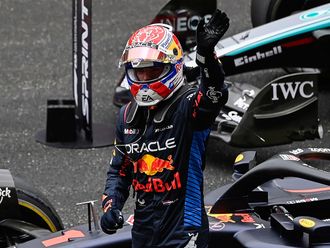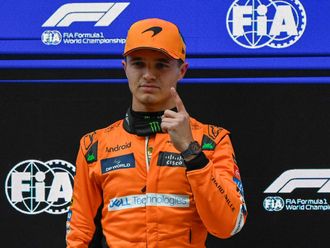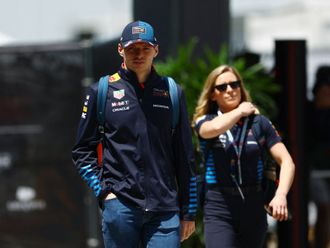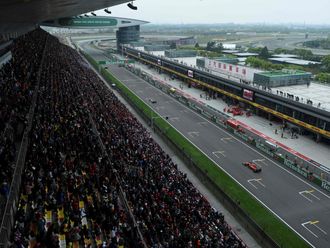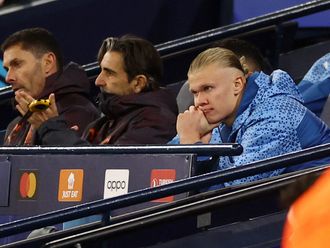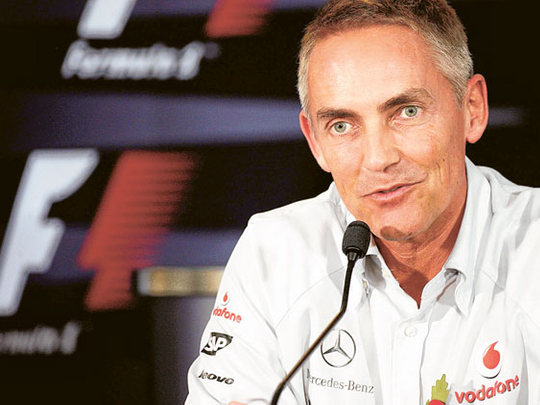
Abu Dhabi: With a total of 20 world championships under their belt, the McLaren team have been one of the most successful outfits in Formula One racing history. With a dynamic leader like Martin Whitmarsh, who took over from Ron Dennis in 2009, the team's vision and dedication have remained unchanged: McLaren want to make a difference in our lives.
In January 2007, Dennis sold half of his 30 per cent shares in the McLaren Group to Bahrain's Mumtalakat Holding Company leaving himself with a 15 per cent stake. In 2009, Dennis, together with co-owners Mansour Ojjeh's TAG Group and the Bahraini Mumtalakat Holding Company, bought back Daimler AG's 40 per cent shares in a deal that will see a conclusion this year. Originally trained as an engineer who then became a business manager in the aerospace industry, Whitmarsh joined McLaren in 1989 when the company were looking to diversify and develop its business. And since then, McLaren have not failed to deliver quality.
GULF NEWS: What is the secret of the success of a team like McLaren?
Martin Whitmarsh: The success of McLaren is down to the passion to win and the passion to be the best in the world. That is the goal that you need to set out towards. And then you need to have great people, good teamwork, great partners and an open and honest plan.
What does it feel to you belonging to a line of McLaren legends that includes Bruce McLaren, Teddy Mayer and Ron Dennis?
I feel I am in the company of legends. I am not suggesting that I am a legend, but I think it is very fantastic and very humbling to have my name written in the same sentence along with these three people.
Bruce was a race-car designer, driver, engineer and inventor. [Unfortunately, Bruce McLaren died aged 32 when his CanAm car crashed on the Lavant Straight just before Woodcote corner at Goodwood Circuit in England on June 2, 1970].
The second legendary boss was an American motor racing entrepreneur, Teddy Mayer [September 8, 1935 — January 30, 2009) who assumed control of the McLaren team after Bruce McLaren was killed in 1970. Teddy Mayer made McLaren successful again in several categories of racing, including Formula One and Indy Cars.
Mayer's successor also came from within the ranks of the company when Ron Dennis CBE [born June 1, 1947] became team principal of McLaren, the group's Formula One team from 1981 until 2009. Dennis and his team certainly had a vision for McLaren to grow beyond being an F1 team "only".
From its past, McLaren is F1 GP. McLaren's past, McLaren's heart, McLaren's soul and the company's main DNA is F1 GP. McLaren will remain in F1 for the future. And that is why it is very important for McLaren to win, and we are all very deeply passionate about winning.
How does McLaren benefit the common man off the racetrack?
Our idea is to take on greater responsibility and expand Formula 1 technology beyond the track. The McLaren MP4-12C is the first sports car designed production car wholly designed and built by McLaren since the McLaren F1 and manufactured by McLaren Automotive.
McLaren also run their own electronics company that is a world leader in motorsports electronics: McLaren Electronics provides the electronics in F1 GP to all the other F1 teams including the paddock F1 competitors. In addition, we provide electronics for IRL, Nascar, LMP1, GT and the World Championship Rally.
McLaren are doing work in the area of health care and putting some instrumentation on human beings as we take the aspect of remote condition monitoring of the car and applying it to monitoring people. The idea is to organise patients to have medical sensors hooked up to them, transmitting data to their doctors.
Are there any other areas?
A neighbour application has been prepared to support and train UK athletes in a number of professional sports including rugby, canoeing, bobsleighing and cycling.
McLaren's miniature sensors go inside the paddle, so every time an athlete applies force on the water, the sensor measures it and transmits the data back to see how fast the boat is going. The sensors were also installed into the sleigh of the Great Britain's women's bobsleigh team, which won the Women's World Bobsleigh Championships in Lake Placid, USA, in 2009.
McLaren's most famous product, besides its road cars, is probably the ultra-light carbon-fibre racing bike, Venge. It is developed in partnership with US cycling firm "Specialized". It is said to be the fastest road-racing bicycle in the world.
It must be quite a proud moment to touch such elite sports performances.
McLaren have already made a mark in certain elite sports. It is providing performance into a professional sports environment and that can be through simulation, technology or data analysis.
For instance, McGrath are an autonomous business that employ around 30 engineers working on everything from bikes to bobsleds, from helmets to heart-rate monitors.
How do you develop a group behind the team?
This is what is very satisfying having been in the company for so long. If I walk in the engineering department of F1 and if I look at the chief engineers, technical directors, heads of department, most of these people or a lot of them were recruited by me as graduate engineers quite a few years ago.
How long do you see yourself heading up the McLaren group?
Well, that is probably for the shareholders to decide! I have enjoyed a long run in the business. I hope to be around for another decade. I hope I don't wait around too long and won't let some of the very talented managers and engineers and entrepreneurs that we have now recruited and developed in our business push me out of the door too quickly!
What is your best memory?
The most pleasure is having joined the company 20 years ago as we were a F1 team. We had a brand that was equivalent to many Formula 1 teams and a long way behind Ferrari. Today, we are still somewhere behind Ferrari in terms of brand values. But we are a long way ahead of the other teams in term of image and brand value.
We are undeniably the second biggest motorsports brand in the world. The business and the people in the team are the most pleasurable memories.
McLaren: Success story
8 Constructors' titles: 1974, 1984, 1985, 1988, 1989, 1990, 1991 and 1998.
12 Drivers' titles: Emerson Fittipaldi (1974); James Hunt (1976); Niki Lauda (1984); Alain Prost (1985, 1986, 1989); Ayrton Senna (1988, 1990, 1991); Mika Hakkinen (1998, 1999); Lewis Hamilton (2008).


